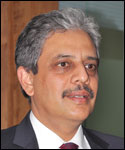 Arun Varma, Global Strategic Business Unit Head — Education and Training, CMC Limited
Arun Varma, Global Strategic Business Unit Head — Education and Training, CMC Limited
Arun Varma, an alumnus of IIT Calcutta, has 26 years of experience in the field of education, training and information technology. He has spearheaded several multinational business operations and has experience in starting up businesses in the education space. Arun Varma discusses key aspects of project management in an interview with Lalitha Rao.
Construction is highly labour oriented and projects are often delayed owing to and unforeseen reasons. How can an efficient project manager ensure the completion of projects on schedule?
Given these times, I would certainly agree to the fact that there are many challenges which are unforeseen at the time of planning. However, with the best practices learnt over a period of time, today we are better equipped to handle real time issues than we were a few years ago. There has been a noticeable trend in this sector, which is the change in approach to building structures. In a performance-based approach it is important to understand that decisions, choices and tradeoffs start with the required behaviour-in-use rather than already documented solutions, to meet the objectives.
The economy and the opportunities that have presented themselves has led to an increase in size and complexity of projects and ultimately to a growing reliance on contractors’ capabilities and project management (PM) skills. With the onus now on the contractor, from owners and developers earlier, it has now become a widespread practice of an end-to-end execution process being overseen by the project management consultant (PMC), who monitors and ensures successful delivery of the project.
Given the increasing cost escalations and project delays becoming a reality in today’s infrastructure and construction space, contractors seem to have realised the need for strong PM frameworks to be in place as they seek to form alliances with project management companies to handle complex projects. Although this appears to be still in a very nascent stage in India, we are confident, given global best practices, that having an overall control through an experienced project management team can be considered the key to mitigating time and cost overrun risks as it brings out efficiencies in cost.
Project Management is a new term in the development sector. What are your suggestions for young civil engineers graduating today?
Project Management is an art which is the best lesson I have learnt over the years and can only be mastered if one continues to be flexible within the realms of accepted standards and practices. Contemporary project management practice demands not only that engineering professionals master the principles of engineering including construction concepts, but also possess a strong background in engineering and management methods.
On site, behaviour forms an integral part of the learning curve with newer technology, developments and techniques in both domestic and international project management and construction should ideally be a part of the self-help curriculum.
To set oneself on a successful path, I believe it is absolutely important to be able to understand interrelationships of all lifecycle components: planning, design, manufacturing, construction, operation, maintenance, and end-of-life options. And fundamentally keep identifying the connections between various stages of this process.
 What is the role of the project manager in India today?
What is the role of the project manager in India today?
The role of a project manager includes supervision of work undertaken by the contractor and subcontractors along with ensuring timely procurement and adequacy of resources. A major part, which does turn out to be one of the most challenging tasks, is also to document and keep reporting progress and issues to owners, developers and contractor in a timely fashion. We are happy with the progress made by the sector so far and continue to work along with our partners to address issues on our way.
What are your views on the new real estate policy?
The announcement was bound to have a conversation started and it is just not about favouring a sector and not the other. We honestly believe that this policy comes bearing fruits to the sector as a whole and with time, would work itself to suit the interests of all its stakeholders.
How can civil engineering students be trained to adapt to better technology in projects?
I strongly believe that most text books on this subject treat special problems, such as cost estimation, from the viewpoint of particular participants such as construction managers or contractors with relatively few offering distinct groups of specialist literature on planning, design, management, construction and other sub-specialties. It appears that fragmentation of interest and attention exists in nearly all educational programmes. While speciality knowledge may be essential to accomplish particular tasks, students and professionals pursuing advanced degree programmes should also understand the context and role of their special tasks.
Do you agree that a fresh engineer should be given complete freedom while executing a project under supervision but with no interference?
I have had the honour and it’s been a privilege to work with some of the best minds and the most talented people in the industry today. Over the years, with the team that we have been able to build around here, there are things which have personally helped me shape into the professional I am.
What clearly we are short of, and I say this fuelled by the need to get better with each passing day, are fresh ideas. However, the best of ideas do require support and have to be nurtured till they realise their final forms. It is an experience in some sense to be able to collectively deliver on client’s expectations and see a team of bright, young and ambitious people stretch themselves in order to do so.












Project Management is becoming very scientific and ensuring reduction in deviations from the design concept, keeping the cost and time at optimum. Many tools are available today to consistently monitor progress of a project and ensure corrective action on time to minimise cost and time overrun. Certainly, professionals manage better, a project supported by the wisdom of experienced mentors on top. Youngsters do get opportunity to express their innovative ideas, and worthwhile proposals and ideas do get implemented along with a pat on the back of the young dynamic professionals.
[…] institutions for bringing this into the curriculum and enabling a career prospect for individuals. Project management in today’s scenario is a widely accepted career option with rising awareness that a good manager […]